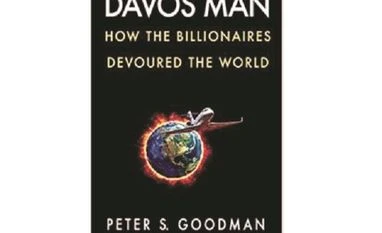Capitalism has been facing a bad rap, and not all of it has to do with Russian oligarchs or Vladimir Putin’s kleptocrat model of state capitalism. Davos Man is a scathing look at capitalism in its heartland, the US, as typified by several of its prominent beneficiaries.
Peter S Goodman, Global Economics Correspondent of the New York Times, tracks “five key specimens” to highlight a familiar argument: That US billionaires have suborned economic and political policy-making to enrich themselves at the expense of ordinary people. The chosen five are all male and white: Jeff Bezos of Amazon, Jamie Dimon of JP Morgan Chase, Marc Benioff of Salesforce, Stephen Schwarzman of Blackstone and Larry Fink of BlackRock. Other “creatures” under observation for playing a “symbiotic role in preserving Davos Man’s dominance” include the founder of the Davos meets, Klaus Schwab (who displays an unexpected talent for Davos Man-type behaviour), Bill Clinton, Emmanuel Macron and, naturally, financial luminaries of Donald Trump’s administration.
Davos Man, familiar shorthand to describe the globe-trotting billionaire (we have Indian species too), takes its reference from the annual gathering of global movers and shakers organised by Mr Schwab of the World Economic Forum that takes place at a storied ski town in Switzerland every January. Ostensibly, it is meant to be a confluence between wealth and policy-making to discuss the world’s pressing problems: Climate change, gender imbalance, and so on. In fact, Mr Goodman, a veteran of these gatherings, writes, “the Forum is a staging ground for business deals and strategic networking, a schmooze fest underwritten by financial behemoths and consulting firms…”.
The term was coined by the political theorist Samuel Huntington. He used it, Mr Goodman tells us, to describe billionaires “so enriched by globalization and so native to its workings that they were effectively stateless, their interests and wealth flowing across borders… their arsenal of lobbyists and accountants straddling jurisdictions, eliminating loyalty to any particular nation.”
If you read the liberal western press the contours of the story are familiar. These are people from elite backgrounds, who leverage their social networks to build fortunes and suborn governments (via handsome political donations) into granting generous tax breaks that bloat their wealth even as public spending is axed. Mr Goodman attributes growing inequality (though, strangely, there is no mention of Thomas Piketty’s influential work) and the emergence of right wing nationalism around the world to their malign influence.
With frequent references to private jets, yachts and oceanfront mansions, Mr Goodman’s book runs the risk of descending into a lefty screed. If he keeps you turning the pages it’s because he has built his arguments by offering examples of Davos Man double-speak using the term that’s in vogue: Stakeholder capitalism or compassionate capitalism. This bogus notion posits that it is possible to do good by making lots of money. “We have to say it,” Mr Goodman quotes March Benioff as saying at the 2021 Davos conference held virtually because of the pandemic. “CEOs are definitely the heroes of 2020.”
This self-congratulatory statement was a reference to how Mr Benioff and his fellow billionaire CEOs had banded together to secure protective gear for hospitals, how big pharma had banded together to develop Covid-19 in record time and bankers unleashed credit to prevent bankruptcies.
The other side of the picture that Mr Goodman reveals still has the power to nauseate —even if you are inured to Mr Bezos’ well-documented exploitative ways or the federal bailout that made investment bankers even wealthier.
Marc Benioff is a good example. His company Salesforce is a dominant player in customer relationship management software. In 2018, he and his company spent $7 million on a campaign to raise taxes on San Francisco companies like his to help eradicate homelessness. This selfless act must be seen against the fact that in the same year, though his company’s revenues were $13 billion it paid “the modest sum of zero in federal taxes” by deploying 14 tax subsidiaries from Singapore to Switzerland. Mr Goodman calls it a “masterful display of accounting hocus-pocus that made its taxable income vanish”.
He recounts the case of TeamHealth, one of two largest players in the emergency staffing room industry, owned by Blackstone. Its core business practice was to pay doctors based on Relative Value Unit, i.e., extracting more income from each patient (a familiar predicament for Indians in private hospitals). In the US, this created the problem of “surprise billing” when ER patients and families hurriedly signed off on expensive procedures, a practice that attracted a class action suit plus a Congressional enquiry. The consequences of this type of amoral profit-maximising just-in-time medical operation exploded during the pandemic with crippling shortages —in beds, medicine, protective equipment —that turned the US into a pandemic epicentre. TeamHealth was at the centre of that scandal too.
Mr Goodman traces Davos Man’s activities to France where BlackRock played a role (which it denied) in Mr Macron’s controversial pension reform to allow for a certain amount of savings to be deployed in the stock markets (one of the triggers of the Yellow Vest protests). Even so-called havens of “good” capitalism as Sweden were not immune to Davos Man’s lures.
Most of the book is a depressing read but Mr Goodman optimistically offers alternative models of governance through community participation and, yes, higher taxation of the rich. But the former are yet to demonstrate scalability and the latter will remain prey to the need for ever-rising political donations. Democracy is an expensive business and Davos Man is a disproportionate beneficiary.
Unlock 30+ premium stories daily hand-picked by our editors, across devices on browser and app.
Pick your 5 favourite companies, get a daily email with all news updates on them.
Full access to our intuitive epaper - clip, save, share articles from any device; newspaper archives from 2006.
Preferential invites to Business Standard events.
Curated newsletters on markets, personal finance, policy & politics, start-ups, technology, and more.
)